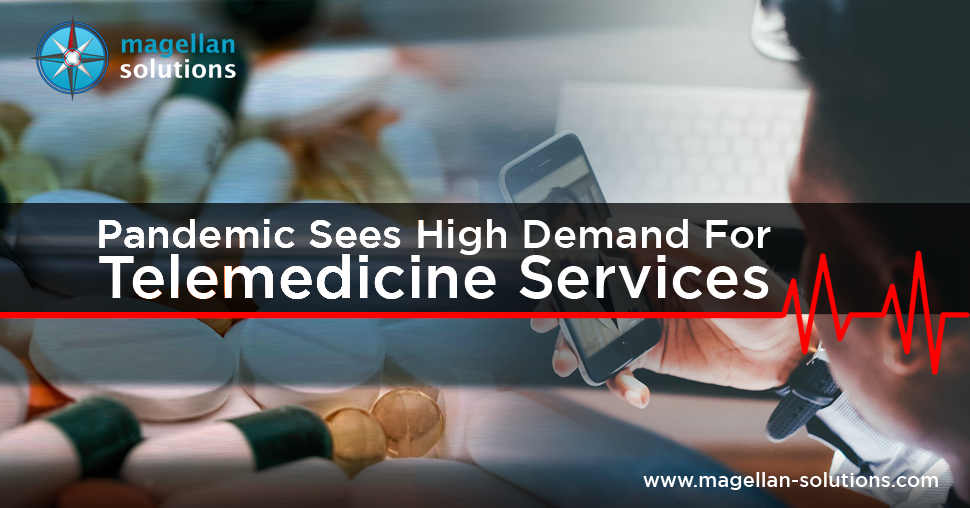Schedule a FREE call with our outsourcing expert now and get a precise quotation that meets your requirements. Don't wait - get started today!
The pandemic has swept the globe and changed the lifestyles of many. People worldwide must stay indoors to quell this pandemic and observe social distancing. This has crippled many industries and made certain services inaccessible. However, it has also increased the demand for telemedicine services.
The demand for telemedicine and related telehealth services was not very high before the pandemic. These services were not even widely known. What has made it vital nowadays is the need for the healthcare sector to limit their on-site services while reaching as many patients as possible.
Telemedicine services are made to deliver healthcare services remotely. Here, a patient who does not need immediate treatment can receive healthcare without close contact with the healthcare provider. This allows for safe and continuous health monitoring, treatment, and care, especially during the pandemic.
The general public has been relatively unfamiliar with telemedicine until now. Even among healthcare providers, however, not all doctors and nurses are trained in telemedicine. To help fill this knowledge gap, this article will answer the following:
- What is a telemedicine service?
- Types of telemedicine services?
- What is the difference between telemedicine and telehealth?
- Advantages and limitations of telemedicine?
- Should you outsource telemedicine services?
- How do you choose a reliable service provider?
- How much does telemedicine outsourcing cost?
- Is telemedicine here to stay?
What is a telemedicine service?
The word “telemedicine” literally means “healing at a distance.” Telemedicine delivers healthcare services from a distance where the patient and healthcare provider are not in close contact. It can be practiced for different purposes, including:
- Diagnosis
- Treatment of injuries
- Treatment and prevention of diseases
- Research and medication
- Patient monitoring
Telemedicine services can be carried out through any communication channel, device, and application. Its goal is to provide clinical services, medical advice, and patient support. It is also meant to improve patient care and information delivery through technology.
Telemedicine services make healthcare more accessible to people who have difficulties going to the hospital. It allows “virtual” visits, which are helpful to patients with mobility issues, elderly patients, and those who reside in remote areas. Ultimately, it gives way to long-distance clinical care, self-healthcare management, and remote diagnosis.
Types of Telemedicine Services
Telemedicine can be carried out for most branches of medicine. As a niche practice, however, most hospitals only provide telemedicine for several methods. Now that it is gaining popularity, the list is getting longer, and here are some of them:
TelePT
Telehealth physical therapy, or telePT, is remotely performing physical therapy sessions. This type of telemedicine strictly requires video-audio channels to carry out effectively. Here, the healthcare provider gives a series of physical exercises that the patient must follow, and it is paramount that the provider can see the patient’s movement.
TelePT services are often given for geriatric physical therapy, neurological physical therapy, postoperative care, chronic pain management, and cancer rehabilitation.
Teledentistry
Teledentistry is about providing oral health care remotely. It utilizes interactive communication technologies, electronic information, and imaging technology. It is a “virtual” visit to the dentist’s office for consultation, monitoring, diagnosis, treatment, or other oral health procedures that do not require physical contact.
Remote eye care services
Remote eye care services refer to a range of healthcare services that focus on the eyes or vision of the patient. Such services include tele-optometry and teleophthalmology.
Remote patient monitoring
Remote patient monitoring is also known as “telemonitoring,” “self-monitoring,” or “self-testing.” This telemedicine technique uses specific devices to monitor a patient’s health and clinical signs remotely.
Telemonitoring is often used for high-risk patients with cardiovascular diseases, asthma, or diabetes. It is also an ideal strategy for monitoring the health of elderly patients.
Personal health app development service
This refers to the development of software applications for general telemedicine services. While there is a lot of telemedicine software in the market, this service allows providers to have applications customized according to their specific needs and the needs of their patients.
Telemedicine support
This branch of telemedicine service is non-clinical. The purpose of telemedicine support is to help patients or other telemedicine users struggling with technical issues. Healthcare providers often use this service to guide elderly patients unfamiliar with telemedicine technology.
Though non-clinical, this service is necessary for ensuring the success of telemedicine. It lifts the tedious but crucial job of training new users from the workload of healthcare providers.
What is the difference between telemedicine and telehealth?
Not everyone is familiar with telemedicine and telehealth services. As such, many would think that telehealth and telemedicine mean the same thing or are interchangeable terms. However, this is incorrect, as telehealth and telemedicine mean different things.
Telehealth refers to a wide range of remote healthcare services. It includes clinical services like telemedicine, telepsychiatry, and telehealth physical therapy. Telehealth covers non-clinical services, including medical education, healthcare provider training, and administrative meetings.
On the other hand, telemedicine mainly involves clinical services and is mostly about delivering healthcare to patients. It is also a subset of telehealth services. So, while telehealth also covers telemedicine, the latter is a more specific service.
Advantages and limitations of telemedicine?
Telemedicine has plenty of advantages for your healthcare practice. However, it has certain limitations as well.
Advantages of telemedicine services
- Convenient: no need for physical appointments or meetings.
- Cost-effective: deliver high-quality healthcare without spending the resources needed for actual visits.
- Serve more patients: virtual visits do not last as long as actual visits, so providers can see more patients in one day.
- Improve relations with patients: providers can communicate with patients at their convenience. Providing personalized telemedicine solutions and support also makes them feel comfortable and appreciated.
- Boosts efficiency: telemedicine improves the efficiency of healthcare practices. Providers can free up more time, resources, and slots to accommodate more patients.
- Better focus on critical patients: healthcare workers will have more time to focus on in-house patients with necessary conditions.
- Reduce unnecessary admissions: telemedicine allows patients to monitor their health at home conveniently, so they prefer to stay home instead of admitting themselves to the hospital.
- Alleviate burnout: for healthcare providers, personal visits for non-emergency concerns add to burnout. With telemedicine, this is prevented and minimized.
Limitations of telemedicine
- Connectivity issues: some healthcare providers and patients may not have access to high-speed internet connections. This can cause a lot of difficulties in telemedicine communications.
- Unfamiliarity: since telemedicine was a niche practice before the pandemic, healthcare staff and patients may struggle with the course. However, this can be alleviated with the proper support and services.
- Data security: you cannot simply use any platform, device, medium, or channel for telemedicine. Otherwise, this can be an issue for patient-doctor confidentiality. This can be addressed using secure platforms or partnering with a HIPAA-certified service provider.
Should you outsource telemedicine services?
Telemedicine outsourcing means that you are hiring a third-party service provider to support your telemedicine service. The support can come in different forms, such as telehealth software, technology, and infrastructure. It can also be outsourced virtual assistants or related services, such as data management and reminder call services.
Outsourcing telemedicine services and support is a cost-effective way to improve the efficiency of your telehealth services. Telemedicine software, platforms, and technology must comply with HIPAA standards; your service provider can handle this. Telemedicine outsourcing also reduces healthcare providers’ workload, which is a huge relief during the pandemic.
For patients and providers struggling with technology, outsourcing also helps. They can have the support and guidance of tech professionals to help them learn how to provide and receive telemedicine services.
You should outsource telemedicine services to improve efficiency, lighten your workload, and have ample support for your practice.
How do you choose a reliable service provider?
Plenty of healthcare BPO companies offer telemedicine or telehealth services. However, some may not fit your practice well or are unreliable businesses. Look out for the following factors when choosing a telemedicine service provider:
- Years of experience: a BPO company that has been in the industry for a while would have enough expertise to provide telemedicine services.
- Reputation: check the reviews and testimonials of former and current clients. It gives you a good insight into what the company is like as a service provider.
- HIPAA certification: data privacy is crucial in telemedicine, so verify that the company is certified. Otherwise, it would be best not to entrust them with your data and patients’ information.
- Vital support service: a reliable service provider should be able to provide adequate support and customer care service. This is especially important when outsourcing telemedicine support.
- Value for money: choose a service provider that offers high-quality services at reasonable and flexible rates.
- Quality control: your service provider should be able to maintain the quality of their services. This means regular and extensive training for their staff and that they are keeping their technology updated.
How much does outsourcing telemedicine services cost?
The business process outsourcing industry offers custom-made services for the clients’ needs. As such, most BPO services, including telemedicine, have no fixed industry rates. Instead, your service provider will determine the cost according to your needs and preferences.
Here are some of the factors that affect telemedicine outsourcing:
- Service(s) needed
- Length of contract
- Number of people you need
- Expertise level of the staff
- Add-on plans or programs (e.g., business continuity plan)
Take note that pricing factors may vary per company. So, you should discuss this with their representatives and ask for a quotation.
Is telemedicine here to stay?
Telemedicine is very likely to stay even after the pandemic.
Most global crises are set to redefine what is expected, and the pandemic is no exception. Experts around the globe are already considering how the new standard would look after the pandemic. Some lifestyle changes and safety measures taken for the pandemic will stay.
According to tech experts, telemedicine could be one of those changes that would stay and become part of the new normal. Patients and providers have come to embrace the benefits of telemedicine. It is a safe, convenient, and efficient way to deliver healthcare. So, even after the pandemic, it makes sense for telemedicine to continue rising as part of the “new normal.”
Are you looking for a reliable healthcare BPO?
Magellan Solutions has been a healthcare BPO company for over 15 years. We offer telehealth and telemedicine support services as well as healthcare call center services. Our healthcare outsourcing services also include processing insurance claims, billing, coding, and transcription.
When you partner with us, you will have a team of highly trained professionals to support your practice. We also keep our team up-to-date with the latest industry technology and innovations to ensure the quality of our service. Our company is also HIPAA and ISO-certified, so your data is safe with us.
Want to learn more about our business? Contact us today!















